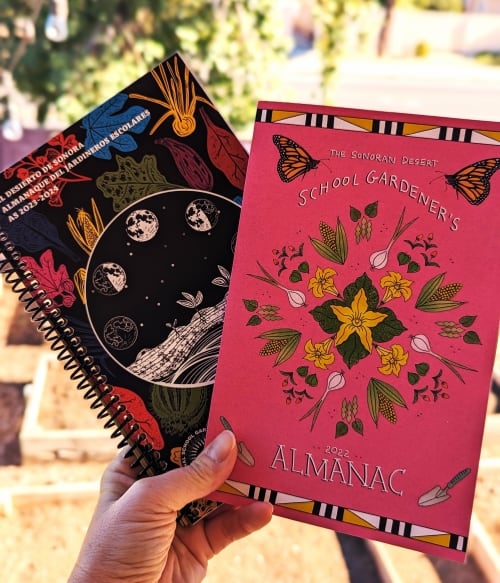The Sonoran Desert School Gardener’s Almanac, published by the University of Arizona School Garden Workshop, is described in its foreword as a “love letter to the Sonoran Desert, its people, and its food heritage.”
For Moses Thompson, Director of the School Garden Workshop, who conceived of the almanac in 2019, there could be no better way to describe the intention behind the work, which involves gardening with Southern Arizona’s youngest learners across Tucson Unified School District.
That intention centers on curating knowledge from the community in which they’re working and weaving it into the students’ curriculum. This novel educational approach caught the attention of the Sprouts Healthy Communities Foundation, which has funded the project since the beginning.
“The students see themselves and they see their families and their own heritage reflected in the Almanac. None of this is written by an academic or an agricultural extension. It’s written by parents, grandparents, aunts, uncles, and people in the community. It’s a curated book of knowledge that has become a gardening handbook.”
-Moses Thompson, Director of the School Garden Workshop
The almanac’s latest edition, released for the 2023-2024 school year, features moon gardening practices utilized by Indigenous peoples along with recipes that correlate with seasonal harvests unique to the Sonoran Desert. It highlights the area’s rich cultural connection between the O’odham land on which they are working and the ceremonial value of gardening. And of course, it contains a helpful and prescriptive planting calendar to guide school garden teachers through the desert’s unique planting seasons. Additional almanacs for other regions of the country are in the works.


Perhaps a less expected outcome from the almanac, however, is the feeling of empowerment students are embracing as a result of their connection to it.
“It’s shown the power gardens have to change the way people feel about themselves in the moment,” Thompson said. “And that’s what we want to tap into…when a child starts to believe they have agency in a world where the obstacles and struggles are real.”
Selene Leyva, Food Literacy Program Coordinator with the School Garden Workshop, can relate. Her involvement in helping to create the almanac has unexpectedly helped her fill a void related to her family’s immigration from Mexico to the U.S. when she was a child.
“I often reflect on my journey, growing up in the same school district I have the privilege of serving today, and I can’t help but imagine the impact of having a resource like the almanac back then.” Leyva said. “A decade ago, if I had encountered something like the almanac that resonated with me, it could have been a guiding light. Growing up, representation was scarce, and now, we’re changing that narrative and empowering the next generation.”
As a Deferred Action for Childhood Arrivals (DACA) recipient, Leyva is restricted from traveling internationally, leaving her physically separated from her grandmother and other extended family members for years.
The almanac, which encourages intergenerational sharing of recipes from elders, provided a much-needed connection for Leyva and her “nana.” While working on the almanac, Leyva reached out to her nana to talk about nopales — a tender pad on the prickly pear cactus she often uses in salsa and other recipes – and learned so much more in the process.

“Cultural knowledge and traditions live so deeply in our families and uncovering them through the almanac project provided an ‘aha’ moment, for me” Leyva said, remembering how her mother didn’t realize the value of dishes she often throws together without the guidance of a recipe card. “We pass down recipes by being in the kitchen alongside each other, so it’s really interesting and rewarding to try to put them down on paper because it so rarely happens.”
As for the cultural connection the almanac provides, Leyva found a much-needed therapeutic link to her heritage and her family across the border.
“Growing up, I often felt isolated and under-represented,” she said. “But I finally have that sense of belonging that I was looking for as a kid. As an adult, I’m grateful that I found that sense of community through this work. The almanac has done for me things I could have never imagined.”
Request a copy of the Sonoran Desert School Gardener’s Almanac, supported by the Sprouts Healthy Communities Foundation, here.

